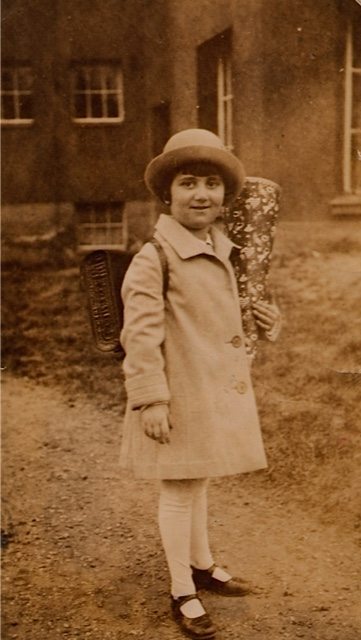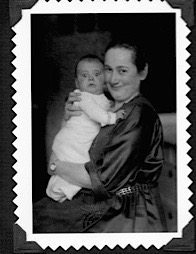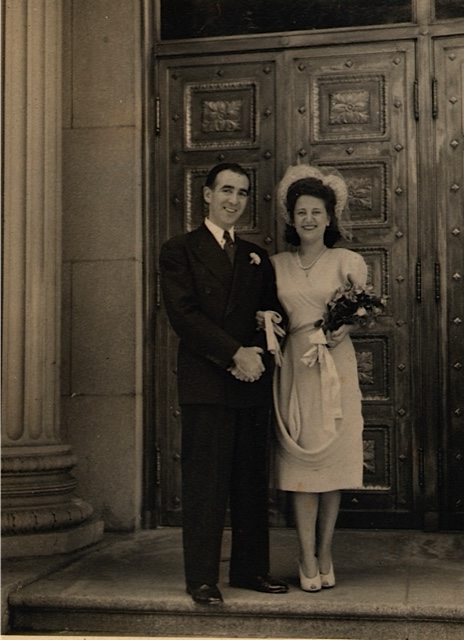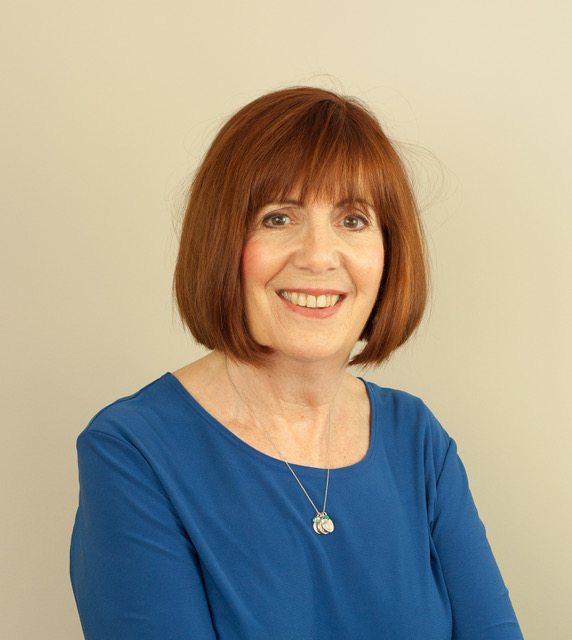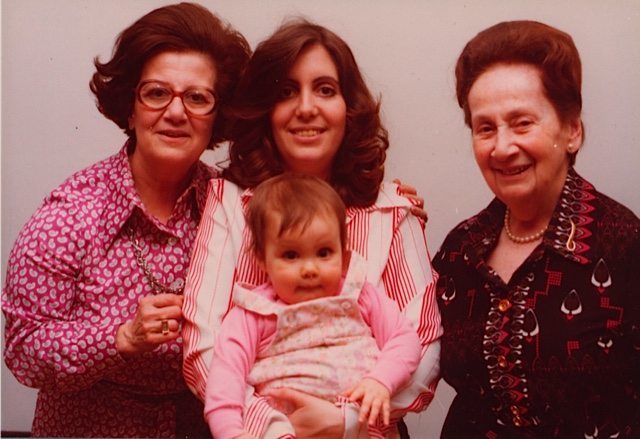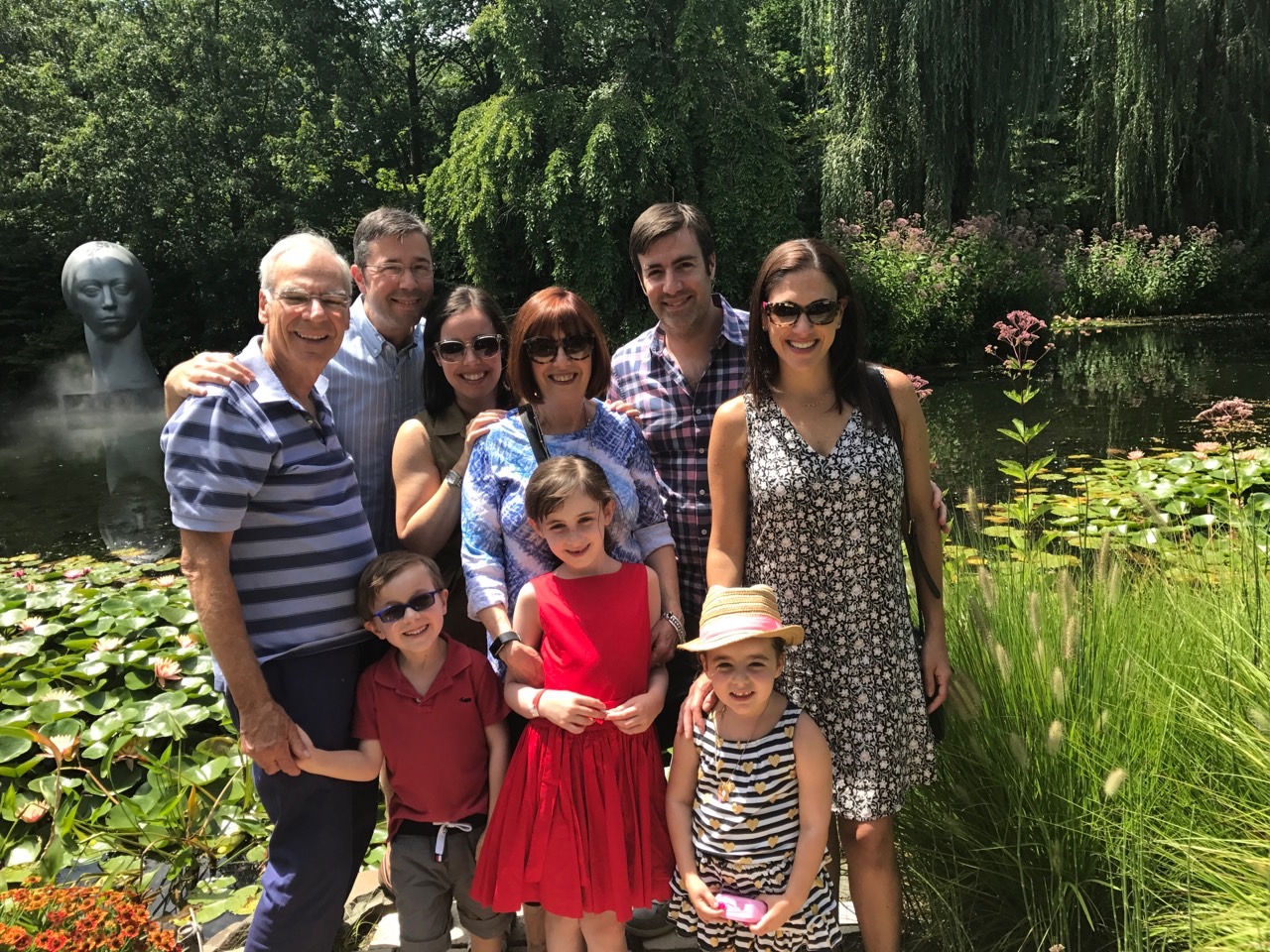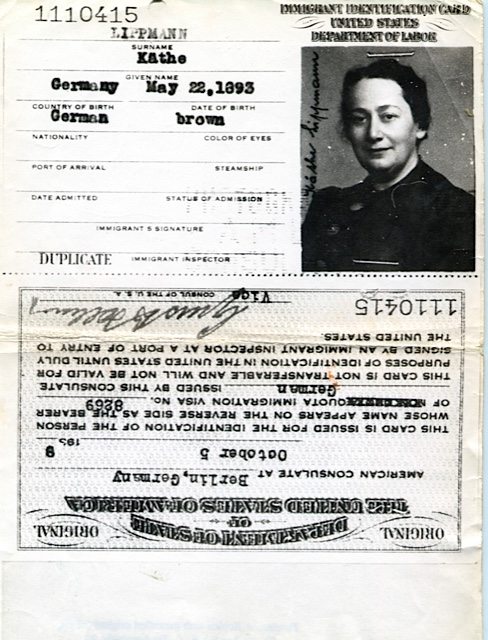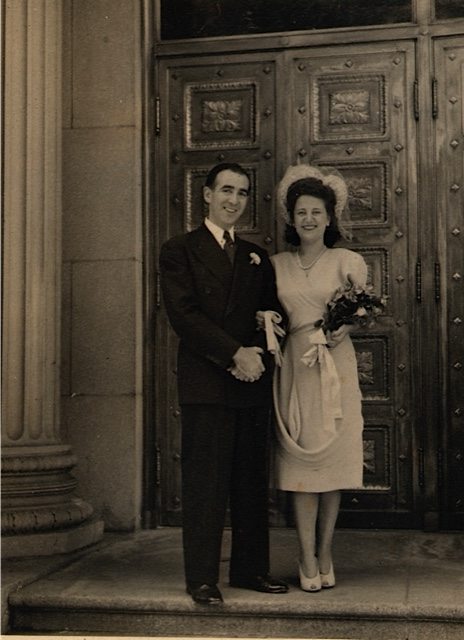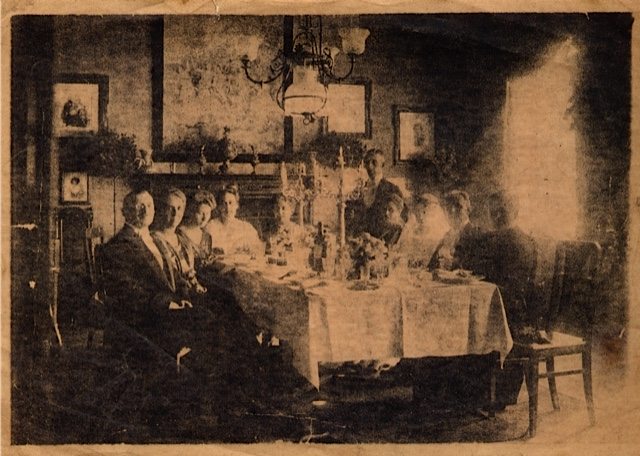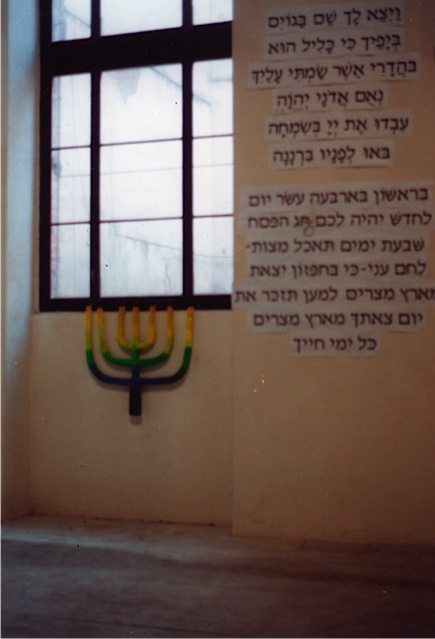- Local Survivor registry
- STEFFI MANNHEIMER
- Local Survivor registry
- STEFFI MANNHEIMER
Survivor Profile
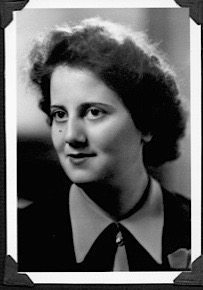
STEFFI
MANNHEIMER
(1921 - 1997)
PRE-WAR NAME:
STEFFI LIPPMAN
STEFFI LIPPMAN
PLACE OF BIRTH:
BRESLAU, GERMANY
BRESLAU, GERMANY
DATE OF BIRTH:
DECEMBER 16, 1921
DECEMBER 16, 1921
LOCATION(s) BEFORE THE WAR:
BRESLAU, GERMANY; OUTSIDE OF LONDON
BRESLAU, GERMANY; OUTSIDE OF LONDON
LOCATION(s) DURING THE WAR:
LONDON, ENGLAND; NEW YORK CITY, U.S.
LONDON, ENGLAND; NEW YORK CITY, U.S.
STATUS:
SURVIVOR, REFUGEE
SURVIVOR, REFUGEE
RELATED PERSON(S):
EUGENE MANNHEIMER - Spouse (Deceased),
ERNEST LIPPMANN - Father (Deceased),
KATHE GOLDSCHMIDT LIPPMANN - Mother (Deceased),
EVELYN RAUCH - Daughter,
EDEN RAUCH - Granddaughter,
JEFFREY RAUCH - Grandson,
3 Great Grandchildren
-
BIOGRAPHY BY Evelyn Rauch, daughter
My mother and grandmother lived in Breslau, Germany, which is now Wroclaw, Poland. They had a happy life in Germany. Unfortunately, my grandfather, Ernest Lippmann died at a young age. My mother was only seven at the time. My grandmother needed to go to work, and so she took over her husband’s newly established insurance business. In order for her to get started, her husband’s wealthier friends took out large insurance policies on their lives. This act of kindness assured the success of the business and gave my grandmother the will and fortitude to continue on her own. These friends continued to be close and support each other as the situation in Germany began to deteriorate with the rise of anti-Semitism.
My grandmother realized that Hitler and the Third Reich were becoming more and more powerful, and so early on she began to make arrangements to get my mother and herself out of Germany. She had a distant cousin in America who she arranged to vouch for her and my mother. This was not an easy task because many American Jews were afraid that they would become the caretakers of these refugees and so she had to convince Abraham Goldschmidt that the situation was life or certain death and that they would not be a burden. He did agree and actually helped my family financially in the early years in America.
She applied for visas for herself and her daughter to emigrate to America but it was a cruel waiting game until their number would be called. Meanwhile my grandmother was desperate to get my mother Steffi out of Germany. She wrote letters to businesses in England to get my mother a job as a chambermaid. She was finally able to get my mother a position in a boarding house outside of London. Shortly after Kristallnacht, the night of broken glass, my mother was sent to England accompanied by an aunt, not knowing if she would ever see her mother again.
My mother’s longing for her mother at the age of sixteen and a half is well-documented in several letters that I found among the papers in my top draw. There is a poem I found in the pile of papers. It was in German and Eva Neisser translated it for me. It truly expresses how my mother must have felt at that time. I cannot be sure if she wrote this herself but it was at the core of her emotions her whole life.
Mother, home of my soul
My heart longs for you
I wandered near and far,
But never found the peace of home.
Everyone only wants to know his own children,
But he does not want to know others.
I have not found anyone
Who understands me as you do.
Who loves me with all the faults
He finds in me.
When I erred and made mistakes
I was heartlessly ignored.
And felt that only a mother
Could be understanding.
Often during dark nights
I cried, not understanding.
I did not want to continue this life.
I longed for my mother, my mother always
And felt that my mother
Was the home of my soul.
Editor’s Note:
Refer to daughter, Evelyn Rauch, in Voices of the Descendants.
-
SURVIVOR INTERVIEW:
EVELYN RAUCH INTERVIEW
RELATED SURVIVOR: STEFFI MANNHEIMER, MOTHER
KATHE GOLDSCHMIDT LIPPMANN, GRANDMOTHER
Date: April 28, 2017
Location: Rauch Residence
Interviewer: Nancy Gorrell
Q: Describe your mother’s family background.
My mother, Steffi lived a very comfortable life before the rise of Hitler in Breslau, Germany. Her father owned an insurance business but died very young. My mother was only seven years old when she lost her father.Q How did that affect her?
Very deeply. My mother spent most of her time with a nanny who was a great influence on her. My grandmother, was needed to go to work to support the family. Her friends helped boost the insurance business by buying large insurance policies on their lives. This got my grandmother, Kathe started.Q: Did your mother have any siblings?
No. She was an only child.Q: What was her schooling like?
My mother was only educated through the age of 16 when her schooling was abruptly interrupted by the deteriorating climate in Germany. Early on, her mother decided that she needed to be sent to England for her safety.Q: Did she experience any anti-Semitism in her early growing up years?
Only later on. My mother was quite protected by her family. She went to a Jewish school.Q: So…she didn’t mention any anti-Semitism?
No. She never talked about her early years. I only found out about her teenage years after her death.Q: Is that what your memoir, Surviving Steffi is about?
Yes. But it is also about relationships and how keeping secrets leads to misunderstandings. It’s the whole crux of the story.Q: Did your mom witness Kristallnacht? Did she ever talk about it?
Yes, she witnessed it, but she never talked about it. Both my grandmother and mother said, “The past is the past; we are Americas now.”Q: When and how did your mother leave Germany?
After Kristallnacht, November 1938, my grandmother began writing letters to employers in England seeking any position possible for a 17-year old girl. She had been preparing Steffi with cooking classes and domestic classes. She placed advertisements in newspapers, and finally Steffi was offered a position as a chambermaid in England.Q: How did your mother make her way to England?
As far as I know, she travelled with an aunt.Q: What happened to Kathe, her mother, when Steffi left?
She was awaiting her number to be called to go to the United States. She let her daughter go to England to keep her safe because she didn’t know when their numbers would be called. The thing about my grandmother that was so amazing was that she started this process to get out of Nazi Germany before so many others did. She found a distant relative in the US who she asked to vouch for them. She got two affidavits and it was not easy. She knew that she would have to leave her mother and mother-in-law behind since she could not secure safe passage for them.Q: What were the difficulties they encountered coming to the US?
My grandmother had to convince Abraham Goldschmidt, a distant relative of her father’s that she and Steffi would not be a burden to him or his family once they came to the US. A lot of wealthy Jews in the US were afraid that these German refugees would become a burden.Q: What was your mother’s experience in London? Did she ever talk about being there during the war?
No, she did not. But a close friend of my grandmother who I only met after my mother and grandmother’s deaths, told me about their lives at that time. I found letters that tell a story that she was not treated well in England.Q: Who did not treat her well?
Her first employer. When the situation deteriorated and England was afraid of a German attack, her employer, knowing that my mother was German, considered her the “enemy,” even though she was Jewish.Q: How long was your mother in England and where did she live?
She lived at her place of work—a boarding house. She was in England approximately, a year and a half, from November 1938 to February 1940.Q: Did she have contact with her mother during those years?
Very sporadically. She never really knew if she would see her mother again.Q: How did your mother make her way to America?
My mother went to the American consulate in England and was absolutely elated when she finally received an affidavit to come to America. She wrote to my grandmother, who had now emigrated to the US and told her that she would travel by convoy in a couple of days knowing full well that the letter would arrive just a day or two before she arrived. My mother didn’t want to worry her mother.Q: Do you know the story of their reunion in America?
Eva, my grandmother’s friend, told me about it. It must have been one of the most joyous days in my mother and grandmother’s life.Q: Why was Eva so close to your grandmother and knew so much?
Eva wrote to me after my mother’s death and told me that my grandmother was one of two people she admired most. One was Eleanor Roosevelt and the other was my grandmother. When the situation in Germany deteriorated, my grandmother’s friends who took out the insurance policies to help her get started in her business were losing their jobs, being thrown into prison and becoming penniless. That is when my grandmother decided to take a big risk and cash in their insurance policies as if they were dead. But they weren’t dead, and that money saved their lives by bribing the officials to get them out of Nazi, Germany. So Eva and her family owed their lives to my grandmother. If my grandmother had been caught with this deception, she surely would have been sent to a death camp. And my mother would have never seen her mother again.Q: Is this the story that prompted you to write your book, Surviving Steffi?
Yes, by Eva translating all my mother’s papers and telling me the story behind them. I also went back to Breslau several years ago, now Wroclaw, Poland to retrace my mother’s early years. -
HISTORICAL NOTES:
Kristallnacht
Also known as The Night of the Broken Glass. On this night, November 9, 1938, almost 200 synagogues were destroyed, over 8,000 Jewish shops were sacked and looted, and tens of thousands of Jews were removed to concentration camps. This pogrom received its name because of the great value of glass that was smashed during this anti-Jewish riot. Riots took place throughout Germany and Austria on that night.
-
Sources and Credits:
Credits:
SSBJCC Survivor Registry Interview, April 28, 2017, Interviewer: Nancy Gorrell; Biography, Evelyn Rauch, daughter; Digital historic and family photographs donated by Evelyn Rauch.
The SSBJCC Holocaust Memorial and Education Center gratefully acknowledges the donation of the memoir, Surviving Steffi by Evelyn Rauch and the historic documents and family photographs therein.


